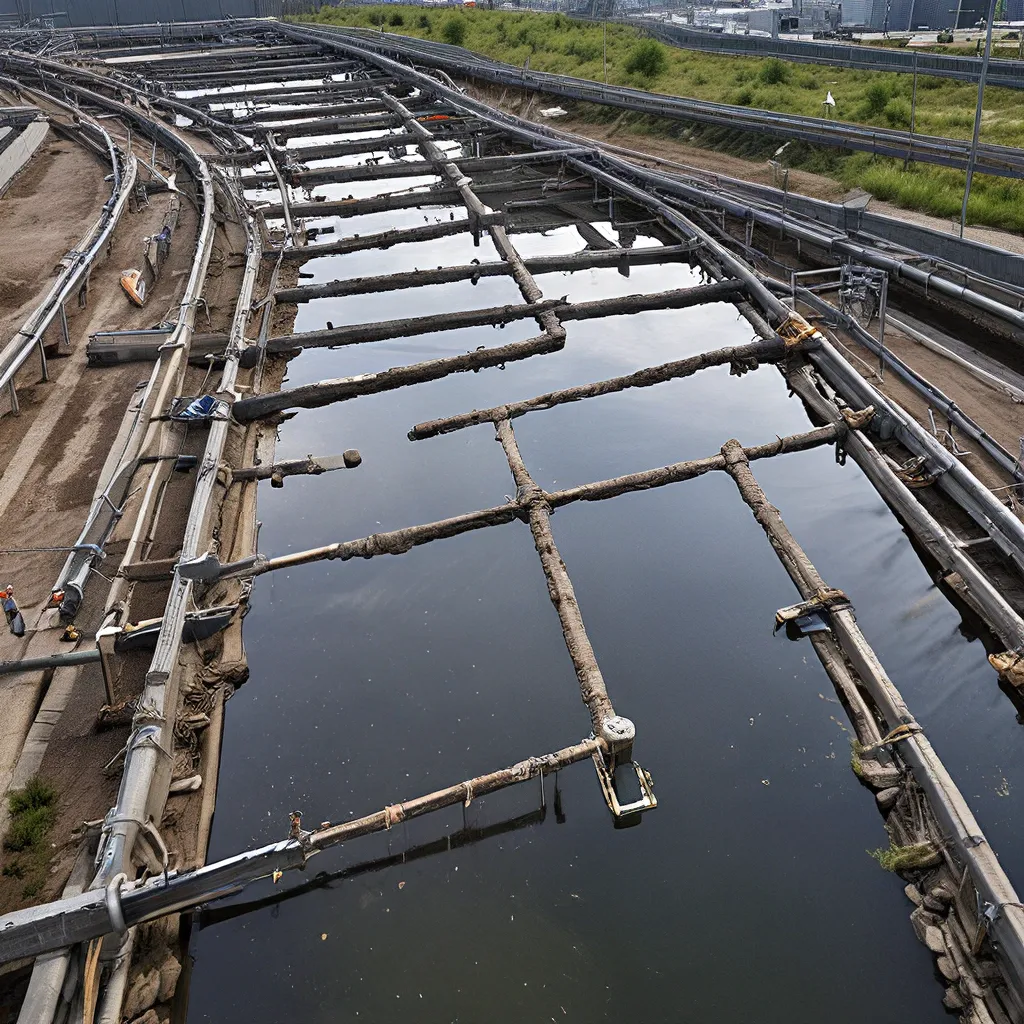
Ah, the wonderful world of wastewater management – where one person’s trash becomes another’s treasure! As a self-proclaimed water enthusiast, I’ve been keeping a close eye on the latest trends and innovations in this dynamic industry. And let me tell you, the future is looking bright, or rather, a whole lot greener.
Embracing the Circular Economy: The Rise of Wastewater Upcycling
I remember the good old days when wastewater was just, well, wastewater – something to be flushed away and forgotten. But times are a-changin’, my friends. The concept of the circular economy is taking the wastewater industry by storm, and it’s all about turning that so-called “trash” into treasure.
According to the Innovating Sustainability report, the average family wastes around 9,400 gallons of water per year, and farming and agriculture account for a staggering 70% of the world’s freshwater consumption. Mix that in with poor recovery technologies, pollution, and contaminants, and our freshwater resources are facing some serious challenges.
But here’s the good news: the solution doesn’t lie in drastically cutting water usage. Instead, it’s all about embracing innovative technologies and practices in wastewater management and treatment. And let me tell you, the industry is rising to the occasion in a big way.
Take Axine Water, for example. This Canadian company is leveraging advanced electrochemical oxidation technology to treat industrial wastewater, turning what was once considered waste into a valuable resource. It’s a classic case of “one person’s trash is another’s treasure,” and it’s just the tip of the iceberg.
Digitalization and the Water Management Revolution
But it’s not just about innovative technologies; the digital transformation of the wastewater industry is also shaping the future in a big way. According to the Idrica report on Water Technology Trends for 2024, the water sector is poised to experience a confluence of technology, sustainability, and cooperation in the face of an increasingly water-stressed world.
One key area of focus is the automation of drinking water treatment plants (DWTPs). By harnessing and optimizing data, these plants can streamline their operations, ensuring optimal hygiene and sanitation conditions for water consumption. And it doesn’t stop there – drinking water networks are also embracing digital transformation, with the implementation of technologies like digital twins, advanced metering infrastructure (AMI), and geographic information systems (GIS).
But it’s not just the drinking water side of things that’s getting a digital makeover. Wastewater treatment plants (WWTPs) are also embracing data-driven approaches, combining new technologies with advanced treatments to improve operability, enhance the quality of treated water, reduce costs, and maximize the value perceived by the customer. Automation, the Internet of Things (IoT), big data, and advanced analytics are all playing a vital role in this transformation.
And let’s not forget about the sanitation networks – they’re also poised for a digital revolution. Smart digital solutions are paving the way for improved prevention and anticipation of overflows, as well as new uses for wastewater, like epidemiology and integration into smart city roadmaps.
It’s a water management revolution, folks, and it’s happening right before our eyes. The future is digital, and the future is sustainable.
Weathering the Storm: Climate Change and the Water Crisis
But with all this talk of technology and innovation, we can’t forget the elephant in the room: climate change. As the official government website reminds us, climate variability and extreme phenomena like droughts and floods are having a devastating impact on the availability of drinking water, particularly in regions like Latin America and the Caribbean.
It’s a sobering reality, but one that the wastewater industry is rising to meet head-on. Digital solutions like decision support systems (DSS) and early warning systems (EWS) are becoming essential allies in building a future where water is managed efficiently, responsively, and sustainably. And let’s not forget about the role of smart buildings and district heating and cooling (DHC) networks in driving energy efficiency and reducing emissions.
Of course, it’s not all doom and gloom. There’s a glimmer of hope on the horizon. As the Idrica report highlights, the water sector is embracing a holistic approach that encompasses everything from prevention to rapid response strategies. It’s a collaborative effort, one that requires international cooperation and the deployment of innovative technologies.
And that’s where we come in, my friends. As wastewater management professionals, we have a vital role to play in shaping the future of this industry. It’s time to dive in, get our hands dirty, and be the change we want to see.
Navigating the Choppy Waters of Innovation
Now, I know what you’re thinking: “Where do I even start?” Well, fear not, because the industry is brimming with innovative startups and disruptive technologies that are poised to shake things up.
Take Axine Water, for example. This trailblazing company is leveraging advanced electrochemical oxidation technology to treat industrial wastewater, turning it into a valuable resource. It’s the perfect embodiment of the circular economy in action.
But Axine Water is just the tip of the iceberg. The wastewater management industry is teeming with visionary entrepreneurs and forward-thinking companies who are redefining the status quo. From smart metering solutions to cutting-edge treatment technologies, the possibilities are endless.
And let’s not forget about the role of collaboration in driving innovation. As the Innovating Sustainability report highlights, it’s through collaboration that innovation can really take off and expand. That’s why Alpha Wastewater is committed to partnering with the brightest minds in the industry, harnessing the power of collective wisdom to tackle the challenges of tomorrow.
So, what are you waiting for? The future of wastewater management is here, and it’s beckoning us to dive in and get our feet wet. Who knows, you might just be the next big disruptor in this ever-evolving industry.